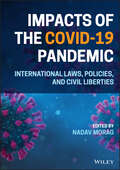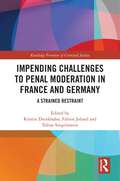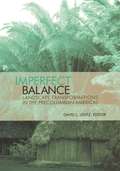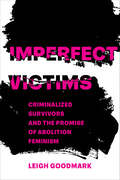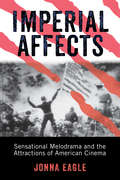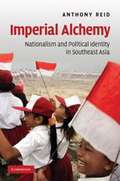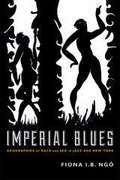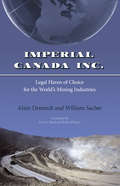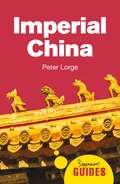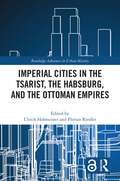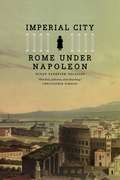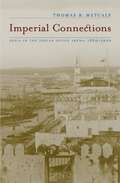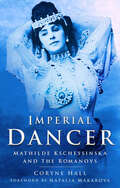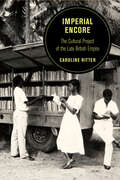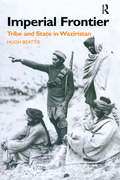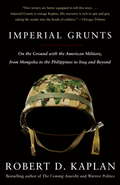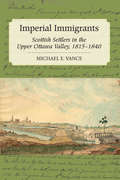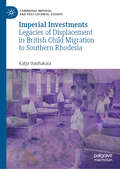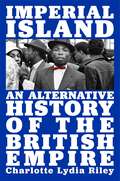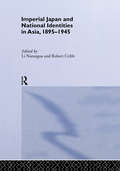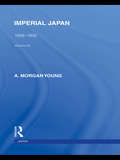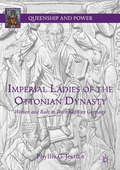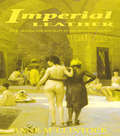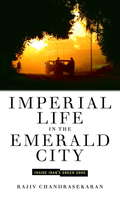- Table View
- List View
Impacts of the Covid-19 Pandemic: International Laws, Policies, and Civil Liberties
by Nadav MoragIMPACTS OF THE COVID-19 PANDEMIC Enables Readers to Understand the Impact of International Legislative and Policy Responses to the COVID-19 Pandemic The wide array of legal and policy responses to the COVID-19 pandemic have significant implications regarding the functioning of countries and their respective societies. This book addresses the impact of international legislative and policy responses to the COVID-19 pandemic in a range of countries. To aid the reader in understanding country-specific developments, each chapter focuses on a specific country and addresses the legal frameworks and policy approaches used to support measures to prevent transmission and otherwise reduce the impact of the virus on society and the economy. Sample topics discussed in the work include: The effect certain policies may have on civil liberties, such as due process, and the right to privacy in specific countries The provision of public goods in the face of the pandemic Policymakers in public health agencies and other branches of government, along with academics studying global pandemic response, homeland security, and emergency management will be able to use this book as a comprehensive resource to understand the current state of COVID-19 policies around the world and the potential future effects of these policies.
Impending Challenges to Penal Moderation in France and Germany: A Strained Restraint (Routledge Frontiers of Criminal Justice)
by Tobias Singelnstein Kirstin Drenkhahn Fabien JobardThis book investigates the penal culture in France and Germany – how it is shaped in politics, media, and public opinion. Although compared with the US or the UK, France and Germany seem to place a strong emphasis on the ideal of rehabilitation that would block excessive punishment and other outcomes of punitive developments in society, there is a steady increase in punitiveness over time for which the term “strained restraint” is proposed. The book shows that the idea of penal moderation is deeply rooted in public opinion, politics, and the media and that it is renegotiated every day in a dynamic interplay between these spheres. Punishment and society research has traditionally focused on the US and the UK. In comparative research, both are considered extreme in punitive developments with high rates of imprisonment and large groups of the population under penal control. The other extreme in comparative research would be Scandinavia with the famous Nordic Exceptionalism marked by low prison population rates. Germany and France are often considered to be “the same” when compared with each other, and “the other” with reference to both of these extremes. However, this book shows that France and Germany are far from being the same when it comes to state organization (centralistic vs. federal), criminal justice and the criminal law, political traditions, and the media. Also, research from both countries has looked at whether developments such as the “punitive turn” have occurred in Germany and France. Research focused on the domestic situation concludes that punitiveness is on the rise, and that both countries are indeed experiencing their own punitive turn. How do we reconcile these contradictory findings? Why do these two seem to follow the path of penal moderation in the overall outcome of punishment in society when we look at comparative research? And how is it that from a domestic perspective, punitive attitudes and desires are leading to more punitiveness? By focusing on the meso level, with a comparative perspective on the two countries and a dynamic analytical approach, this book reconciles the fluidity of individual attitudes and opinions with the relative stability of societal discourse. The authors posit that penal moderation comes at a price: overall and in an internationally comparative perspective, there is penal moderation, but a closer look at the domestic situation and development reveals that it is nonetheless challenged by a slowly rising tide of punitiveness. Going beyond the main tenets of punishment and society research with a dynamic analysis of two large societies in Europe, this book is ideal reading for scholars and students of penology, criminal justice, and European studies.
Imperfect Balance: Landscape Transformations in the Pre-Columbian Americas
by David L. LentzWe often envision the New World before the arrival of the Europeans as a land of pristine natural beauty and undisturbed environments. However, David Lentz offers an alternative view by detailing the impact of native cultures on these ecosystems prior to their contact with Europeans. Drawing on a wide range of experts from the fields of paleoclimatology, historical ecology, paleontology, botany, geology, conservation science, and resource management, this book unlocks the secret of how the Western Hemisphere's indigenous inhabitants influenced and transformed their natural environment. A rare combination of collaborators uncovers the changes that took place in North America, Mexico, Central America, the Andes, and Amazonia. Each section of the book has been comprehensively arranged so that a botanical description of the natural vegetation of the region is coupled with a set of case studies outlining local human influences. From modifications of vegetation, to changes in soil, wildlife, microclimate, hydrology, and the land surface itself, this collection addresses one of the great issues of our time: the human modification of the earth.
Imperfect Balance: Landscape Transformations in the Pre-Columbian Americas (Historical Ecology Series)
by Ed. David L. LentzWe often envision the New World before the arrival of the Europeans as a land of pristine natural beauty and undisturbed environments. However, David Lentz offers an alternative view by detailing the impact of native cultures on these ecosystems prior to their contact with Europeans. Drawing on a wide range of experts from the fields of paleoclimatology, historical ecology, paleontology, botany, geology, conservation science, and resource management, this book unlocks the secret of how the Western Hemisphere's indigenous inhabitants influenced and transformed their natural environment.A rare combination of collaborators uncovers the changes that took place in North America, Mexico, Central America, the Andes, and Amazonia. Each section of the book has been comprehensively arranged so that a botanical description of the natural vegetation of the region is coupled with a set of case studies outlining local human influences. From modifications of vegetation, to changes in soil, wildlife, microclimate, hydrology, and the land surface itself, this collection addresses one of the great issues of our time: the human modification of the earth.
Imperfect Victims: Criminalized Survivors and the Promise of Abolition Feminism (Gender and Justice #8)
by Leigh GoodmarkA profound, compelling argument for abolition feminism—to protect criminalized survivors of gender-based violence, we must dismantle the carceral system. Since the 1970s, anti-violence advocates have worked to make the legal system more responsive to gender-based violence. But greater state intervention in cases of intimate partner violence, rape, sexual assault, and trafficking has led to the arrest, prosecution, conviction, and incarceration of victims, particularly women of color and trans and gender-nonconforming people. Imperfect Victims argues that only dismantling the system will bring that punishment to an end. Amplifying the voices of survivors, including her own clients, abolitionist law professor Leigh Goodmark deftly guides readers on a step-by-step journey through the criminalization of survival. Abolition feminism reveals the possibility of a just world beyond the carceral state, which is fundamentally unable to respond to, let alone remedy, harm. As Imperfect Victims shows, abolition feminism is the only politics and practice that can undo the indescribable damage inflicted on survivors by the very system purporting to protect them.
Imperial Affects: Sensational Melodrama and the Attractions of American Cinema
by Jonna EagleImperial Affects is the first sustained account of American action-based cinema as melodrama. From the earliest war films through the Hollywood Western and the late-century action cinema, imperialist violence and mobility have been produced as sites of both visceral pleasure and moral virtue. Suffering and omnipotence operate as twinned affects in this context, inviting identification with an American national subject constituted as both victimized and invincible—a powerful and persistent conjunction traced here across a century of cinema.
Imperial Alchemy
by Anthony ReidThe mid-twentieth century marked one of the greatest watersheds of Asian history, when a range of imperial constructs were declared to be nation-states, either by revolution or decolonisation. Nationalism was the great alchemist, turning the base metal of empire into the gold of nations. To achieve such a transformation from the immense diversity of these Asian empires required a different set of forces from those that Europeans had needed in their transitions from multi-ethnic empires to culturally homogeneous nations. In this book Anthony Reid explores the mysterious alchemy by which new political identities have been formed. Taking Southeast Asia as his example, Reid tests contemporary theory about the relation between modernity, nationalism, and ethnic identity. Grappling with concepts emanating from a very different European experience of nationalism, Reid develops his own typology to better fit the formation of political identities such as the Indonesian, Malay, Chinese, Acehnese, Batak and Kadazan.
Imperial Blues: Geographies of Race and Sex in Jazz Age New York
by Fiona I. NgôIn this pathbreaking study, Fiona I. B. Ngô examines how geographies of U.S. empire were perceived and enacted during the 1920s and 1930s. Focusing on New York during the height of the Harlem Renaissance, Ngô traces the city's multiple circuits of jazz music and culture. In considering this cosmopolitan milieu, where immigrants from the Philippines, Cuba, Puerto Rico, Mexico, Japan, and China crossed paths with blacks and white "slummers" in dancehalls and speakeasies, she investigates imperialism's profound impact on racial, gendered, and sexual formations. As nightclubs overflowed with the sights and sounds of distant continents, tropical islands, and exotic bodies, tropes of empire provided both artistic possibilities and policing rationales. These renderings naturalized empire and justified expansion, while establishing transnational modes of social control within and outside the imperial city. Ultimately, Ngô argues that domestic structures of race and sex during the 1920s and 1930s cannot be understood apart from the imperial ambitions of the United States.
Imperial Canada Inc.
by Alain Deneault William SacherAsks (and answers) the simple question: why is Canada home to more than 70% of the world's mining companies?
Imperial China: A Beginner's Guide (Beginner's Guides)
by Dr. Peter LorgeIn 221 BCE, the Qin state conquered its neighbours and created the first unified Chinese empire in history. So began the imperial era, where dynasties claiming divine assent ruled for more than 2,000 years. Borders shifted and emperors struggled to exert control over every region of their diverse territories. Elites held that they were inheritors of a rich, pre-imperial culture, while their society produced world-changing inventions such as the compass, printing, gunpowder and the gun. And imperial China itself was altered as it came into contact with others through trade, exploration and war. For anyone curious about this fascinating period, Peter Lorge introduces imperial China&’s major ruling dynasties, religions, arts, thinkers, inventions, military advancements, economic developments and historians.
Imperial Cities in the Tsarist, the Habsburg, and the Ottoman Empires (Routledge Advances in Urban History)
by Ulrich HofmeisterThis book explores the various ways imperial rule constituted and shaped the cities of Eastern Europe until the First World War in the Tsarist, Habsburg, and Ottoman empires. In these three empires, the cities served as hubs of imperial rule: their institutions and infrastructures enabled the diffusion of power within the empires while they also served as the stages where the empire was displayed in monumental architecture and public rituals. To this day, many cities possess a distinctively imperial legacy in the form of material remnants, groups of inhabitants, or memories that shape the perceptions of in- and outsiders. The contributions to this volume address in detail the imperial entanglements of a dozen cities from a long-term perspective reaching back to the eighteenth century. They analyze the imperial capitals as well as smaller cities in the periphery. All of them are "imperial cities" in the sense that they possess traces of imperial rule. By comparing the three empires of Eastern Europe this volume seeks to establish commonalities in this particular geography and highlight trans-imperial exchanges and entanglements. This volume is essential reading to students and scholars alike interested in imperial and colonial history, urban history and European history.
Imperial City: Rome Under Napoleon
by Susan Vandiver NicassioIn 1798, the armies of the French Revolution tried to transform Rome from the capital of the Papal States to a Jacobin Republic. For the next two decades, Rome was the subject of power struggles between the forces of the Empire and the Papacy, while Romans endured the unsuccessful efforts of Napoleon's best and brightest to pull the ancient city into the modern world. Against this historical backdrop, Nicassio weaves together an absorbing social, cultural, and political history of Rome and its people. Based on primary sources and incorporating two centuries of Italian, French, and international research, her work reveals what life was like for Romans in the age of Napoleon. "A remarkable book that wonderfully vivifies an understudied era in the history of Rome. . . . This book will engage anyone interested in early modern cities, the relationship between religion and daily life, and the history of the city of Rome. "--Journal of Modern History "An engaging account of Tosca's Rome. . . . Nicassio provides a fluent introduction to her subject. "--History Today "Meticulously researched, drawing on a host of original manuscripts, memoirs, personal letters, and secondary sources, enabling [Nicassio] to bring her story to life. "--History
Imperial Connections: India in the Indian Ocean Arena, 1860-1920
by Thomas R. MetcalfAn innovative remapping of empire, Imperial Connections offers a broad-ranging view of the workings of the British Empire in the period when the India of the Raj stood at the center of a newly globalized system of trade, investment, and migration. Thomas R. Metcalf argues that India itself became a nexus of imperial power that made possible British conquest, control, and governance across a wide arc of territory stretching from Africa to eastern Asia. His book, offering a new perspective on how imperialism operates, emphasizes transcolonial interactions and webs of influence that advanced the interests of colonial India and Britain alike. Metcalf examines such topics as law codes and administrative forms as they were shaped by Indian precedents; the Indian Army's role in securing Malaya, Africa, and Mesopotamia for the empire; the employment of Indians, especially Sikhs, in colonial policing; and the transformation of East Africa into what was almost a province of India through the construction of the Uganda railway. He concludes with a look at the decline of this Indian Ocean system after 1920 and considers how far India's participation in it opened opportunities for Indians to be a colonizing as well as a colonized people.
Imperial Dancer: Mathilde Kschessinska and the Romanovs
by Coryne Hall Natalia MakarovaThe vivacious Mathilde Kschessinska (1872-1971) was the mistress of three Russian Grand Dukes and the greatest ballerina of her generation. As a young girl, she had enjoyed romantic troika rides, and passionate nights, with the future Tsar Nicholas II. When their relationship ended Mathilde began simultaneous affairs with Nicholas's cousin, Grand Duke Sergei and Grand Duke Andrei Vladimirovich. When her son was born in 1902 nobody knew for certain the identity of the father - except that he was undoubtedly a Romanov. In ballet, she partnered the great Vaslav Nijinsky, became a force to be reckoned with in the Imperial Theatre and, later in life, taught Margot Fonteyn.Mathilde Kschessinska is mentioned in almost every book about the Romanovs but so many myths surround her that she has become the stuff of legend. It is said a hoard of Romanov treasure lies buried under her house in St Petersburg and that a secret passage connected her home to the Winter Palace. Even her own memoirs, published in the 1960s, are as much fantasy as reality. The real story, which this book will reveal, lies in what Mathilde did not say.
Imperial Encore: The Cultural Project of the Late British Empire (Berkeley Series in British Studies #18)
by Caroline RitterIn the 1930s, British colonial officials introduced drama performances, broadcasting services, and publication bureaus into Africa under the rubric of colonial development. They used theater, radio, and mass-produced books to spread British values and the English language across the continent. This project proved remarkably resilient: well after the end of Britain’s imperial rule, many of its cultural institutions remained in place. Through the 1960s and 1970s, African audiences continued to attend Shakespeare performances and listen to the BBC, while African governments adopted English-language textbooks produced by metropolitan publishing houses. Imperial Encore traces British drama, broadcasting, and publishing in Africa between the 1930s and the 1980s—the half century spanning the end of British colonial rule and the outset of African national rule. Caroline Ritter shows how three major cultural institutions—the British Council, the BBC, and Oxford University Press—integrated their work with British imperial aims, and continued this project well after the end of formal British rule. Tracing these institutions and the media they produced through the tumultuous period of decolonization and its aftermath, Ritter offers the first account of the global footprint of British cultural imperialism.
Imperial Frontier: Tribe and State in Waziristan
by Hugh Beattie Dr Hugh BeattieDescribes British relations with the Pashtun tribes of Waziristan in the years after the annexation of the Punjab in 1849, offering the most detailed historical account that has so far been written of relations between the British Government of India and the tribes along this (or any) part of the north-west Frontier in this period.
Imperial Grunts: On the Ground with the American Military, from Mongolia to the Philippines to Iraq and Beyond
by Robert D. KaplanA fascinating, unprecedented first-hand look at the soldiers on the front lines on the Global War on Terror. Plunging deep into midst of some of the hottest conflicts on the globe, Robert D. Kaplan takes us through mud and jungle, desert and dirt to the men and women on the ground who are leading the charge against threats to American security. These soldiers, fighting in thick Colombian jungles or on dusty Afghani plains, are the forefront of the new American foreign policy, a policy being implemented one soldier at a time. As Kaplan brings us inside their thoughts, feelings, and operations, these modern grunts provide insight and understanding into the War on Terror, bringing the war, which sometimes seems so distant, vividly to life.
Imperial Immigrants: The Scottish Settlers in the Upper Ottawa Valley, 1815–1840
by Michael E. VanceThe impact of the British Empire on the history of the Upper Ottawa Valley is explored through the experiences of early emigration-assisted 19th-century Scottish immigrants. Between 1815 and 1832, Great Britain settled more than 3,500 individuals, mostly from the Scottish Lowlands, in the Ottawa Valley. These government-assisted emigrations, which began immediately after the Napoleonic Wars, are explored to reveal their impact on Upper Canada. Seeking to transform their lives and their society, early Scots settlers crossed the Atlantic for their own purposes. Although they did not blindly serve the interests of empire builders, their settlement led to the dispossession of the original First Nation inhabitants, thus supporting the British imperial government’s strategic military goals. After transferring homeland religious and political conflict to the colony, Scottish settlers led the demand for political reform that emerged in the 1830s. As a consequence, their migration and settlement reveals as much about the depth of social conflict in the homeland and in the colonies as it does about the preoccupations of the British imperial state.
Imperial Investments: Legacies of Displacement in British Child Migration to Southern Rhodesia (Cambridge Imperial and Post-Colonial Studies)
by Katja UusihakalaThis book examines the legacy of a British child migration scheme that relocated British children to Southern Rhodesia between 1946 and 1962, with the aim of populating the colony with “fresh white stock”. The selected children were resettled at Rhodesia Fairbridge Memorial College, a boarding school established in a disused RAF airbase outside the town of Bulawayo. This social engineering project sought to “rescue” children from what were predicted as undesirable futures in Britain and offer them a “better life” with prospects of social advancement. Yet, beyond individual salvation, the scheme emigrated the children with the intention that they would help sustain the racially segregated colonial order. Building on long-term ethnographic research with former Rhodesian child migrants, now living in the UK, South Africa, Australia, and New Zealand, this book delves into the children’s unique experiences of migration, displacement, and resettlement. By highlighting these enduring emotional, social, and political repercussions, the author critically addresses how colonial histories matter in the present. Through the lens of former child migrants – whose kin relations were ruptured, who were disciplined into silence and suppression, and who have seen scant public recognition of their past – this book sheds light on the formation of memory through its gaps and silences. It contributes to our understanding of memory in relation to forced migration and displaced communities.
Imperial Island: An Alternative History of the British Empire
by Charlotte Lydia RileyThis riveting new history tells the story of Britain’s journey from imperial power to a nation divided—one that alternately welcomes and excludes former imperial subjects and has been utterly transformed by them.In the turbulent years since the outbreak of World War II, Britain has gone from an imperial power whose dominion extended over a quarter of the world’s population to an island nation divorced from Europe. After the war, as independence movements gained momentum, former imperial subjects started making their way to her soggy shores. Would these men and women of different races, cultures, and faiths be accepted as British, or would they forever be seen as outsiders? In this deeply intimate retelling of the United Kingdom’s transformation from empire to island nation, Charlotte Lydia Riley shows that empire haunts every aspect of life in modern Britain.From race riots to the Notting Hill Carnival, from the Suez Crisis to the wars in Iraq and Afghanistan, from the Monday Club and Enoch Powell’s defiant calls to protect England’s racial purity to Band Aid, the Spice Girls, and Brick Lane, the imperial mindset has dominated Britain’s relationship with itself and the world. The ghosts of empire are to be found, too, in anti-immigrant rhetoric and royal memorabilia, in the pitched battles over how history should be taught in schools—and, of course, in Brexit.Drawing on a mass of original research to capture the thoughts and feelings of ordinary British citizens, Imperial Island tells a story of people on the move and of people trapped in the past, of the end of empire and the birth of multiculturalism, a chronicle of violence and exclusion but also a testament to community. It is the story that best explains Britain today.
Imperial Japan and National Identities in Asia, 1895-1945 (Nias Studies In Asian Topics Ser. #No.31)
by Li NarangoaBetween 1895 and 1945, Japan was heavily engaged in other parts of Asia, first in neighbouring Korea and northeast Asia, later in southern China and Southeast Asia. During this period Japanese ideas on the nature of national identities in Asia changed dramatically. At first Japan discounted the significance of nationalism, but in time Japanese authorities came to see Asian nationalisms as potential allies, especially if they could be shaped to follow Japanese patterns. At the same time, the ways in which other Asians thought of Japan also changed. Initially many Asians saw Japan as a useful but distant model, but with the rise of Japanese political power, this distant admiration turned into both cooperation and resistance. This volume includes chapters on India, Tibet, Siberia, Mongolia, Korea, Manchukuo, China, Taiwan, Vietnam, Thailand, the Philippines and Indonesia.
Imperial Japan: 1926-1938 (Routledge Library Editions: Japan)
by A Morgan YoungA journalist on the Japan Chronicle for eleven years, the author collected in this volume the most significant current events for discussion. They include the financial crisis of 1927, hostilities with China and in particular Manchuria, Japan’s booming manufacturing industry, Japanese nationalism, Japan’s new empire and its place within the Far East and East Asia. Written from a Western perspective, the volume nonetheless presents a balanced view of Japan and its behaviour which only close observation and dealings with the Japanese people could make possible.
Imperial Ladies of the Ottonian Dynasty: Women And Rule In Tenth-century Germany (Queenship and Power)
by Phyllis G. JesticeIn tenth-century Europe and particularly in Germany, imperial women were able to wield power in ways that were scarcely imaginable in earlier centuries. Theophanu and Adelheid were two of the most influential figures in the Ottonian reich along with their husbands, who relied heavily on their support. Phyllis G. Jestice examines an array of factors that produced their power and prestige, including societal attitudes toward women, their wealth, their unction as queens, and their carefully constructed image of piety. Due to their influential positions, Theophanu and Adelheid reclaimed control of the young Otto III despite fierce opposition from Henry the Quarrelsome during the throne struggle of 984. In examining how they successfully secured the regency, this book confronts the outmoded notion of exceptionalism and illuminates the lives of powerful Ottonian women.
Imperial Leather: Race, Gender, and Sexuality in the Colonial Contest
by Anne McclintockImperial Leather chronicles the dangerous liaisons between gender, race and class that shaped British imperialism and its bloody dismantling. Spanning the century between Victorian Britain and the current struggle for power in South Africa, the book takes up the complex relationships between race and sexuality, fetishism and money, gender and violence, domesticity and the imperial market, and the gendering of nationalism within the zones of imperial and anti-imperial power.
Imperial Life in the Emerald City
by Rajiv ChandrasekaranThe Green Zone, Baghdad, 2003: in this walled-off compound of swimming pools and luxurious amenities, Paul Bremer and his Coalition Provisional Authority set out to fashion a new, democratic Iraq. Staffed by idealistic aides chosen primarily for their views on issues such as abortion and capital punishment, the CPA spent the crucial first year of occupation pursuing goals that had little to do with the immediate needs of a postwar nation: flat taxes instead of electricity and deregulated health care instead of emergency medical supplies. In this acclaimed firsthand account, the former Baghdad bureau chief of The Washington Post gives us an intimate portrait of life inside this Oz-like bubble, which continued unaffected by the growing mayhem outside. This is a quietly devastating tale of imperial folly, and the definitive history of those early days when things went irrevocably wrong in Iraq.From the Trade Paperback edition.
